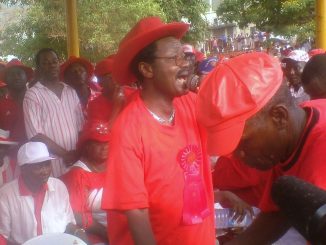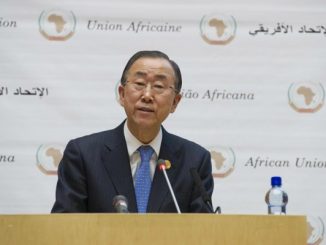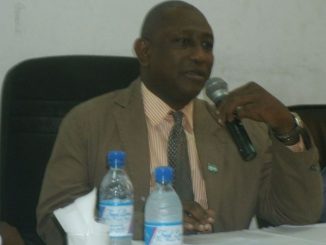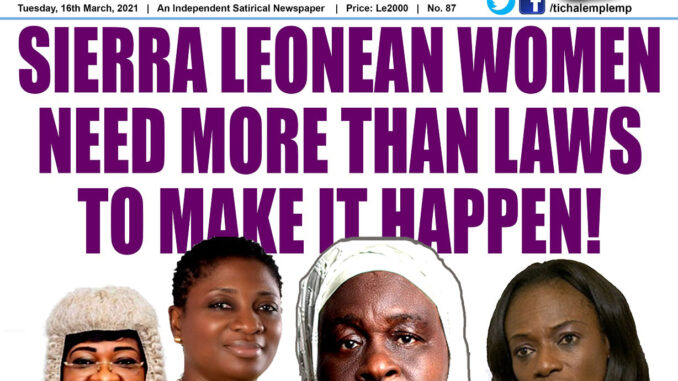
By Ahmed Sahid Nasralla (De Monk)
As celebrations of International Women’s Day continue after March 8th, Sierra Leonean women and girls can draw a lot of inspiration from their history.
Historically, the country’s women contributed hugely to the political, socio-economic, educational, and civil rights development of the nation.From Madam Lehbu, who became Queen of Upper Gaura in 1891 following the establishment of the Province of Freedom in 1787 (what is now known as Freetown); the Sherbro Queen Yamacouba, who was a signatory to the treaty of 1787 which ceded the land to the British; Madam Yoko, the powerful Queen of Kpaa Mende Seneghum; the contribution of Hannah Benka-Coker to education; Lati Hyde-Forster, the first woman to graduate from Fourah Bay College, University of Sierra Leone, with a doctor of civil laws degree; the role of Betsy Carew to commerce in the 1830s; Adelaide Casely-Hayford, one of the pioneers of women’s rights in Freetown and who founded the ‘Girls Industrial and Technical Training School’ with the aim to make women economically self-reliant; to Constance Cummings-John, the first elected woman Mayor in Africa and Frances Wright, the first female lawyer in Sierra Leone, who later became magistrate, legal adviser to the British High Commission in Freetown and a champion of women’s rights, to name but a few.PresentIn succeeding decades Sierra Leone women have built strong pillars on this foundation with many now excelling in governance and politics, the civil service, the private sector, academia, arts and entertainment, and more.
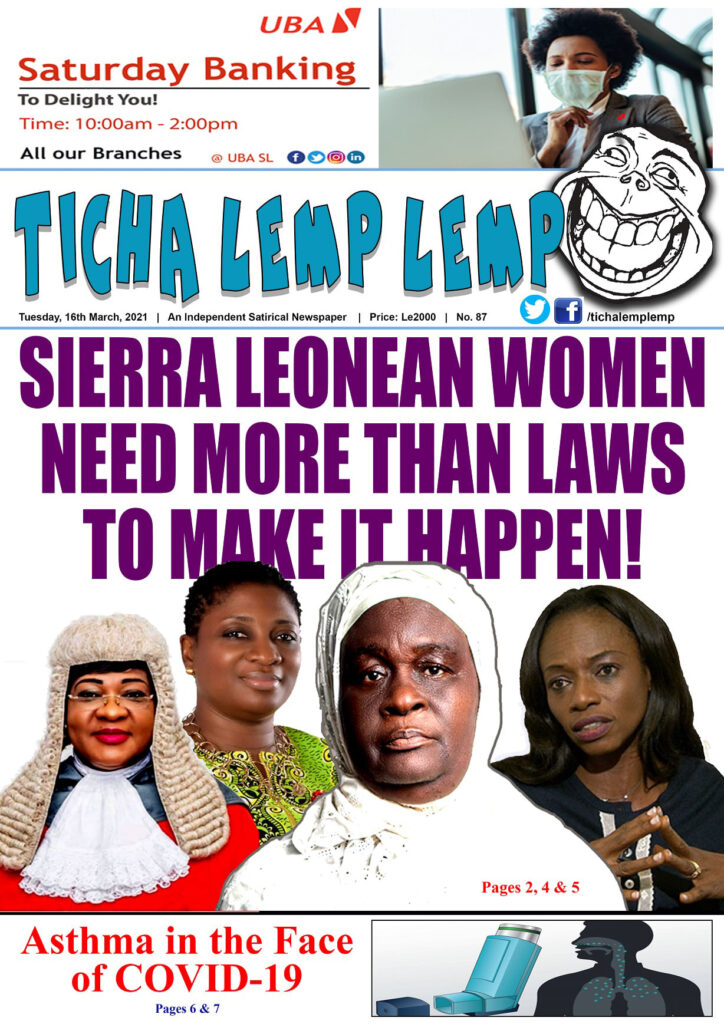
Today, inspiration can be drawn from key achievers against all odds such as the Barefoot Women from Konta line and the nurses who made a lot of sacrifices during the Ebola outbreak (2014 -2016) and continue to do so even with the COVID-19 pandemic.In the Justice sector where they are doing great, women and girls can draw inspiration from Justice Vivian Margaret Solomon, Justice Virginia A. Wright, Justice Shahineh Bash-Taqi, and Justice Umu Hawa Tejan-Jalloh (the First Female Chief Justice).On the international front, we have Justice Miatta Maria Samba who has most recently been elected a Judge of the International Criminal Court; Jamesina Essie Leonora King, Special Rapporteur on Freedom of Expression and Access to Information in Africa and the first Sierra Leonean to be sworn in as a Commissioner of the African Commission on Human and People’s Rights; Haja Zainab Hawa Bangura, Director General UN Office at Nairobi; and Finda Koroma, Vice President at ECOWAS Commission.In governance, there are six women holding ministerial positions and18 honourable members of Parliament. Other role models include Lara Taylor-Pearce, Auditor-General of Audit Service Sierra Leone; Marcella Samba-Sesay, Executive Director of CGG and NEW; Valnora Edwin, former Executive Director of CGG; Mrs. Bernadette Cole, pioneer of the Mass Communications Department at FBC; Nemata Madejks Walker and Dr. Fatu Taqi, former Presidents of Fifty-Fifty Group; Yvette Stevens, Sierra Leone’s first female Engineer; Brig. Gen. (Rtd) Kestoria O. Kabia, the first female to attain that rank in the RSLAF; Elizabeth Turay, Deputy Inspector General of Police; Yasmin Jusu Sheriff, former Vice Chairperson, Human Rights Commission of Sierra Leone; Yvonne Aki-Sawyerr, Mayor of Freetown; Femi Claudius Cole, leader of Unity Party; and Marie Bob Kandeh, Chairlady Sierra Leone Market Women Association.
In sports administration, we have Isha Johansen who has just been elected into the FIFA Council, the highest decision-making body in world football; Victoria Conteh, head coach of East End Tigers FC; and Musu Pele, team coach of the National Under-20 female football team.Still a long wayHowever, the road is still bumpy and a long way for the average Sierra Leonean woman, especially in remote rural settings, who, with a baby strapped to her back, toils the soil, fetches water from the distance stream, carries firewood on her head from the bush, and pounds the native rice to cook the family’s daily meal.There is still a long way to go for the average woman who at a very early age is given by her parents to marriage and starts bearing children in her childhood; the average woman who ignorantly humbly accepts the excesses of her husband as the obligations of marriage; the average woman who age-old traditions deny the right to the property of her deceased husband; the average woman who cannot aspire for a decision-making position in her village because tradition do not allow her; the average woman who has to sell her body to get money to feed herself and her family; the average girl who continues to endure the harassment of her teacher/lecturer to trade sex for passing grades; the average woman who continues to suffer the indignity of rape, domestic violence and sexual harassment; the average woman who suffers in jail because she fails to pay a meager debt; the average woman who dies while exercising her reproductive health right or while giving birth; the average woman who still carries the largest scar of the past decade-long rebel war and continue to bear the brunt of every calamity befalling this nation.
Legislations
Pro-women organizations have been seeking equality and justice for the country’s women through two main fronts: enactment of the right legislation and advocating for increase political inclusion.On the legislative front, the last decade has seen the passing of the landmark three Gender Acts (Registration of Customary Marriage and Divorce Act 2007- as amended in 2009, Devolution of Estate Act 2007, and Domestic Violence Act of 2007), and the Child Rights Act of 2007 the recent Sexual Offences Act of 2012 amended in 2019, the declaration of a National State of Emergency on Rape and Sexual Penetration and the most recently launched Gender Equality and Women’s Empowerment (GEWE) Policy, etc.
These put together seek to protect and advance the status of women in the country. For example, according to one of the laws, women in customary marriage now have the right to own, lease and rent land; a right hitherto denied them.But to have the right laws in place to address the situation is one thing. Whether these laws are understood by the general public and enforced or implemented by the relevant authorities is entirely another huge challenge. Fatmata Sorie, the current President of L.A.W.Y.E.R.S- an organization of young female lawyers providing free legal representation and advice to protect and promote the rights of women and girls in the country, holds the opinion that our laws have serious gaps that must be addressed and one such law is the Registration of Customary Law and Divorce Act which conflicts with the Child Rights Act of 2007, making it legal for children under 18 to be exposed to early marriage. She, therefore, urges the Government to take steps to harmonise our laws and eliminate Child Marriage.“While the status of women has somehow improved I am concerned about the current trend of denigrating the work of women in Leadership/Governance.
I am afraid the space for women in Governance to thrive is under attack. If this trend continues, there will be serious hesitation on the part of women to serve and we will return to the era where people will begin to ask “where are the women?”. We must as a nation match our words with action; as such while I look forward to the drafting and passing of the “Gender Equality’ or “Affirmative Action bill” as promised by President Bio, let us guard those women who currently serve our nation selflessly,” says Fatmata. She continues: “On the issue of Sexual and Gender-Based Violence particularly rape and sexual penetration; one can only continue to implore the Government to commit the much-needed resources for the establishment of a forensic lab. The numbers based on the data from Rainbo are alarming.
I wonder what the picture will be if we are to receive the nationwide data from the Police and other stakeholders.”Mariama Dumbuya, a former President of L.A.W.Y.E.R.S, believes there’s an improvement, but more needs to be done to reduce domestic violence and sexual offences, for example. “We need people to come out and report these abuses rather than suffering in silence and we need to strengthen our legal system to make it accessible and expedite cases of such nature,” says Mariama, who is a partner in the commercial firm of Lambert & Partners and continues to do charitable human rights work.
A similar concern is shared by Jamesina King: “These laws, also reflected in the National Development Plan, are a step in the right direction. However, their implementation remains a challenge; institutions are weak and women become frustrated in their attempts to seek justice or to access benefits meant for them,” says Jamesina.Doom statisticsIndeed, the laws say one thing but the reality on the ground speaks differently.In the Kailahun division of the Family Support Unit, records show that between 2017 to 2019 Sexual Penetration of a child accounted for 140 cases; this includes other offences such as rape, sexual harassment, sexual touching, meeting a child for sexual purpose, and assault with intent to ravish totaling 159 cases.From June 2020 to March 2021, the Eastern region district recorded 71 cases of sexual penetration, but only one conviction so far of a physically challenged who got a jail term of 60 years. Three of the cases were committed to the High Court; while seven have gone through preliminary hearings at the Magistrate Court; four are still with State Counsel awaiting advice. Nine cases have been compromised by parents. Sadly, for the rest of the cases, the alleged perpetrators are still at large.In terms of rape, there were three cases in 2020, but none recorded so far in 2021 in the district, which was the epicenter for rape and sexual penetration in previous years. (Source: FSU/One-Stop Center, Kailahun District).At the national level recent statistics from the Sierra Leone Police reveal that since the Presidential Proclamation in March 2019, a total of 470 new sexual penetration and rape cases were prosecuted in Court. Between March 2019 to September 2020 the courts nationwide recorded a total of 152 convictions; 64 convictions since the establishment of the Sexual Offences Model Court in July to September 2020 and 88 convictions from March 2019 to the end of June 2020. (Source: National Crimes Statistics, SLP- 2017-2020)
.In Freetown, the capital city where the Judiciary sits, there was once a case involving a ‘prominent lawyer’ who was found guilty of molesting his wife and was fined a ludicrous One Million Leones as a penalty by the presiding Judge.Loopholes in the laws
Meanwhile, it is even confusing to realise that some of these laws relating to issues of women are in themselves un-protective of women or discriminatory against the very women they seek to protect.For example, the Devolution of Estates Act 2007 provides that a woman is deemed married to a man after cohabiting as husband and wife for continuously 5 years. However, although there are provisions in another Act- the Registration of Customary Marriage and Divorce Act 2007, as amended in 2009, for this union or cohabitation to be made legal through registration, some men are taunting the provision by saying that they will stay with their women in the pretext of marriage for four (4) years and throw them out before the union clocks five (5) years to escape the provisions of the law.There’s also the Registration of Customary Marriage and Divorce Act, which provides for the registration of all marriages contracted customarily. Women find its provisions very difficult to abide by. Also, the necessary requirements made by the Local Councils who are deemed fit to register such marriages is also a challenge for the women of Sierra Leone.Take also sub Section 27 of the 1991 Constitution as another case in point.
The beginning of the section guarantees non-discrimination yet went on to give exceptions in sub-section 4d that in the case of adoption, devolution of property, burial, etc, there can be discrimination.If the laws on adoption and devolution of estate, for example, do not discriminate it is wrong for the parent law, the Constitution, to carry such discriminatory section that is even contrary to Section 15 of the same Constitution, which also guarantees non-discrimination.Similarly, in the country’s citizenship law, Sierra Leonean identity is achieved through paternity. What happens to the children of a native woman then when the father is a foreigner and has abandoned them and returned to his homeland?Also in the area of Chieftaincy, by virtue of our Chieftaincy Act Sierra Leone women cannot be Paramount Chiefs except tradition permits. Therefore, some women in certain parts of Sierra Leone are better than the others because tradition is by itself discriminatory.
This is why women Paramount Chiefs in places like the North and Kono in the South are unheard of. It matters not whether the woman is from a ruling house. Although the Act does not specifically say women, by interpretation it is obvious it excludes women because it’s generally known that the ‘Poro Society’ is not open to women in the context of tradition and Paramount Chieftaincy rights.AdvocacyIn the area of advocacy, the loudest voice has been for the 30% political quota for women. During the Constitutional Review process, women wanted this to be reflected in the new laws.
Women organizations believe that increase political participation or inclusion will greatly enhance the status of the country’s women.Indeed, there has been increase in the number of women in decision-making positions in their communities at various levels and in the governance of the state.
Women have been actively participating in development activities.But, like the laws, that is just a starting point. How they utilize such positions to make it happen for the ordinary woman and the next generation of women should be the focus.Going forward According to Jamesina, research has to be conducted to get accessible, credible, qualitative, and quantitative data on the situation of Sierra Leone women in different spheres.“This will help in developing strategies and programs to address gender issues and women’s advancement. And then we will really know whether we are actually succeeding or failing,” she says.Yet the question remains: who’ll make all these happen?

